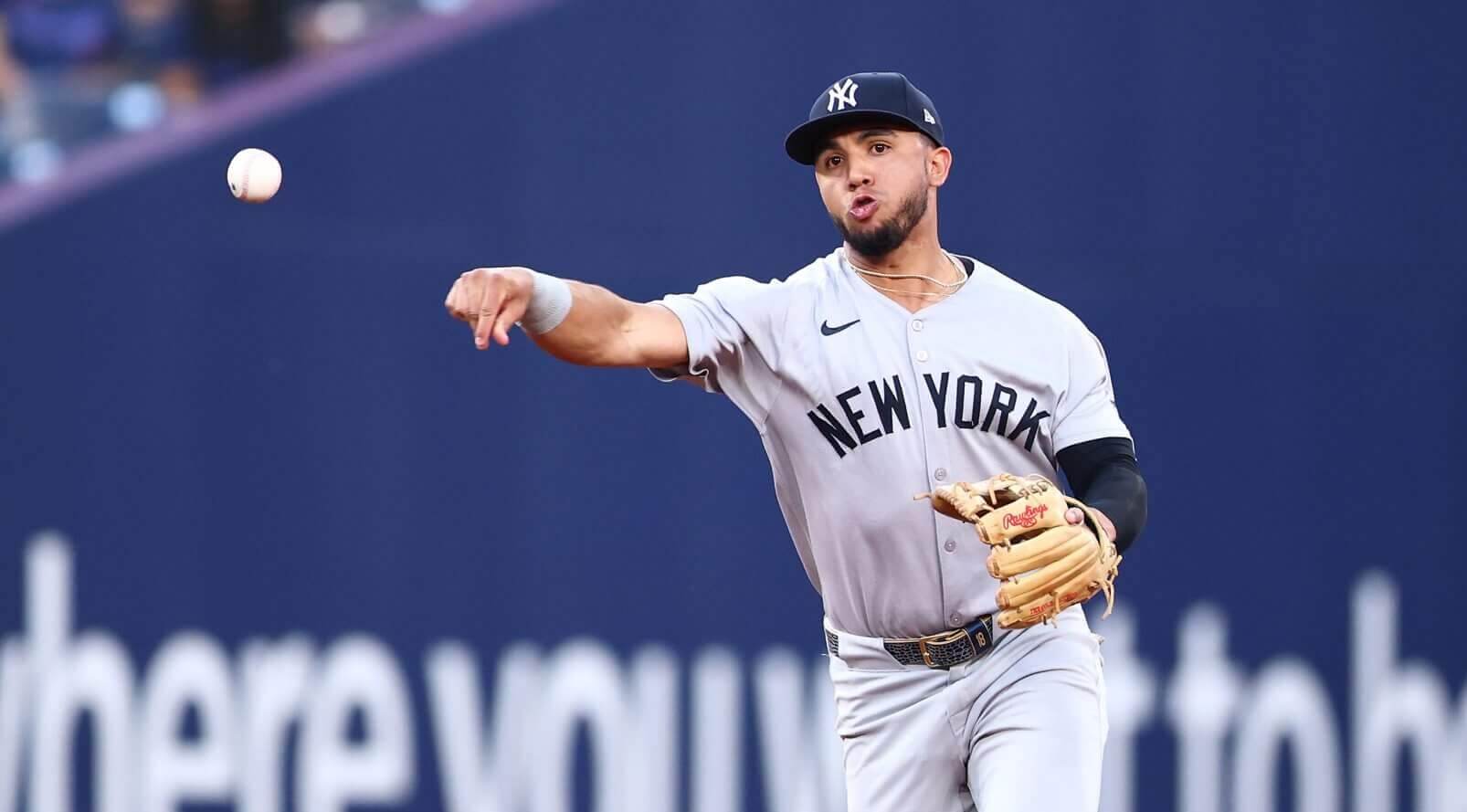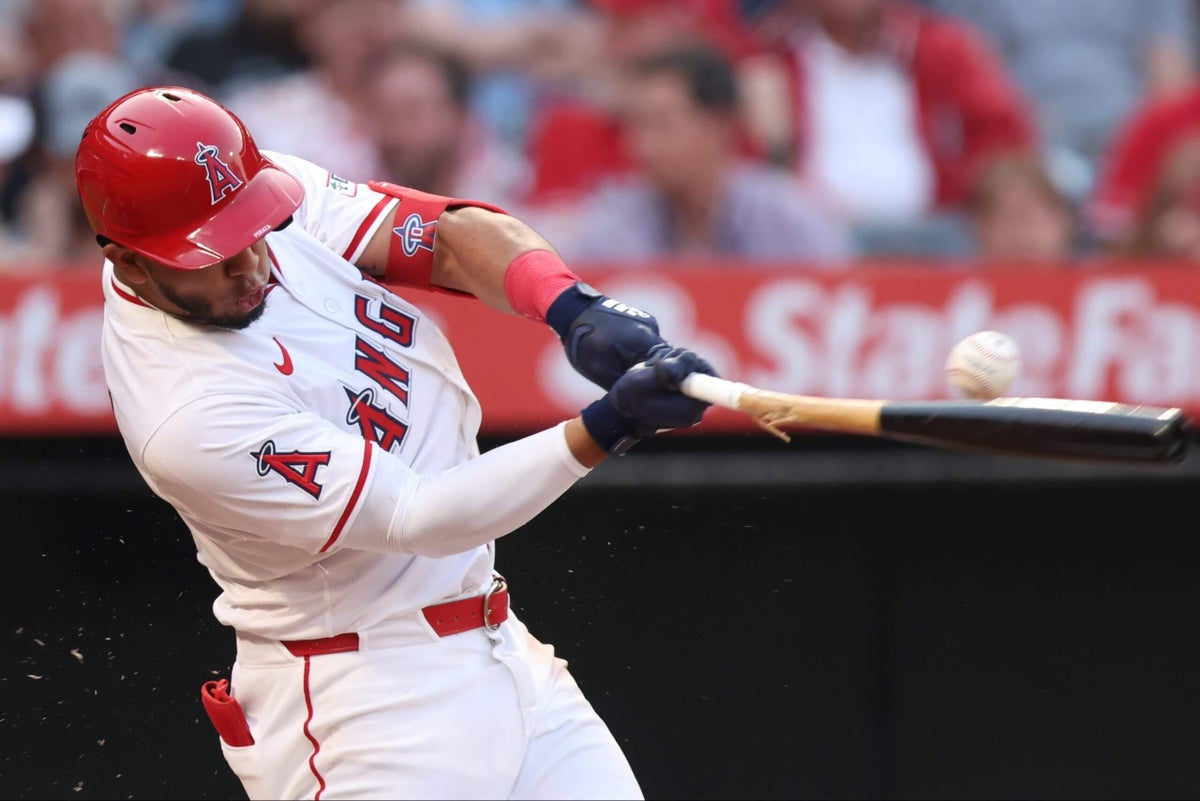ANAHEIM, Calif. — In the waning days of Oswald Peraza’s New York Yankees tenure, he was asked an uncomfortable question by a reporter in a packed scrum, after a bad loss.
“How disappointing is it that you haven’t been able to take this opportunity and make the most of it,” he was asked, along with a reminder that the Yankees were reportedly searching for his replacement, and that “a lot of people” had been waiting for his career to take off.
Peraza, 25, was once a top infield prospect for the Yankees. However, on this date, just 10 days before this year’s trade deadline, the writing was on the wall. His career in New York was likely coming to an end. Still, he stood there and answered the question, saying he tries to focus on the work, the things he can control.
The question appeared painful to answer, reflective of the immense scrutiny of failing in an environment with high expectations.
Days later and minutes before the MLB trade deadline, Peraza was shipped to the Los Angeles Angels for an 18-year-old Dominican Summer League prospect and $73,766 of international bonus pool money — pennies to the dollar on his once sky-high potential.
“When it comes to wearing the Yankee uniform, it’s a lot of pressure, but it’s also a lot of responsibility,” Peraza told The Athletic in front of his locker at Angel Stadium last week, through an interpreter. He was explicitly asked about that question and the difficulty of confronting it.
“I was trying to do my best to not let that weigh on me, because all I could do is play baseball. And yeah, carrying that uniform, it does have a weight to it. But I know the type of ballplayer that I am.”
The question Peraza got that night might have been hard to confront. However, the underlying facts behind it were not wrong, either. Peraza hit just .190 with a .542 OPS over parts of four seasons in New York, spanning 145 games.
He was once ranked No. 76 on Keith Law’s Top 100 prospects, and No. 3 overall in New York’s system, behind only Jasson Dominguez and Anthony Volpe.
While his speed and elite defense were almost always on display, his bat was not. Pitch recognition has been a consistent struggle, with a 32.4 percent whiff rate that is well above the 25 percent league average.
Peraza said he believed his issues were rooted in a lack of playing opportunities.
“It all comes down to opportunity,” Peraza said. “I was accustomed to playing every day in the minors. That helped me — seeing the pitchers a whole lot more, seeing their stuff. Even if I had a bad day, I had the confidence I would play the next day. And that part helped me work on what I needed to work on.
“Right now, I’m not adapted to that, I’m not accustomed to that, but I know it’s something I’ve got to learn. Because I know if I were to have the opportunity to play every day, I can look at these guys better because they’re really good pitchers. And it helps me make the adjustments I need.”

Oswald Peraza was ineffective in a limited role with the Yankees. (Vaughn Ridley / Getty Images)
Peraza primarily served as a defensive replacement for the Yankees, with occasional starting opportunities. From May 20-30, he started all but one game, but went just 3 for 25 with eight strikeouts. The same could be said for July 3-13, when he went just 3 for 27 with nine strikeouts.
He has barely gotten a shot with the Angels, starting just one game and taking only eight plate appearances. Angels interim manager Ray Montgomery doesn’t have a spot to put him at the moment, with a largely solidified infield. However, that doesn’t mean Peraza is only here as window dressing.
“When you pick somebody up like him, his skill set, that’s what you’re envisioning,” Montgomery said at the potential of Peraza becoming an everyday player. “He’s still really young. He’s never really had a full-time opportunity to get that chance. Sometimes a change of scenery is all you need.”
All the tools are there to believe it’s possible. He’s posted six defensive runs saved this season, despite his limited opportunities. His sprint speed is in the 95th percentile, according to Baseball Savant. Even his swing speed is well above MLB average.
For Peraza, it’s a matter of making contact with off-speed and breaking pitches, and hitting the ball in the air with more consistency. Right now, his offense is almost exclusively striking out and pulling grounders. The Yankees had seen enough of that.
“When the move came up, I had a bit of nostalgia,” Peraza said. “It’s the team that gave me the chance, that signed me and gave me a shot at the major-league level. But that’s part of baseball. I arrived here, I’m learning. I’m turning the page.
Ultimately, the Angels have a choice to make with Peraza. While he won’t be arbitration-eligible until 2027, he has no minor-league options remaining. Either he’s going to be a part of their big league plans now and in the future. Or he’s going to be DFA’d.
Until that decision is made, he has to exercise patience and use every opportunity he has to show the team that he can be the hitter he believes he’s capable of becoming.
“I know the ballplayer that I am,” Peraza said. “Once I prove that I can play every single day, those numbers are going to be up there.”
(Top photo of Oswald Peraza: Joe Scarnici / Getty Images)
